OverTheWire Leviathan Challenges
Leviathan is another set of beginner Linux challenges at OverTheWire. These challenges previously lived at intruded.net and are quite different from the Bandit challenges. You SHOULD be trying these challenges yourself. Writeups and answer guides like this should be your last resort if you need a hint.
These challenges have no instructions, we just have to use some Linux command line knowledge to find the passwords to the next levels.
Note: if we get sick of typing the passwords we can save them in a file and enter them with the ssh command:

$() is a way of executing a command inside the command, or as stack overflow describes it:
The expression
$(command)is a modern synonym forcommandwhich stands for command substitution; it means, run command and put its output here.
Leviathan 0
We have to search the leviathan home directory for hidden files / folders. We find a backup folder which contains a web browser bookmarks file. There is a lot of information here, so let’s try something obvious like grepping for the word “leviathan” (we can also grep for password or whatever):

Viola, the password to leviathan 1.
Leviathan 1 pass: rioGegei8m
Leviathan 1
Here we have to know of a certain command called ltrace here to make it easier. ltrace means library trace and will trace the library calls of an executable. We have a setuid executable here for leviathan 2 and when we run it, it asks for a password. Give it the wrong password and it exits.
Note: we can use strace for even more heavy lifting checking system calls rather than library calls.
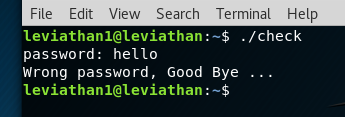
We can hexdump or strings the binary to find some readable text and if we are looking hard enough, we can see a hint to the 1995 movie Hackers …

Which, in the movie, mentions the most common passwords are secret, love, sex and god:
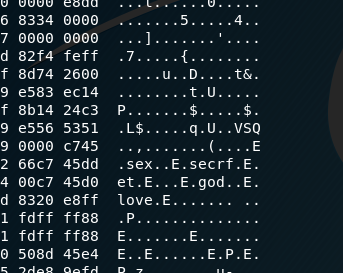
Still, this isn’t clear so let’s run ltrace on the binary.
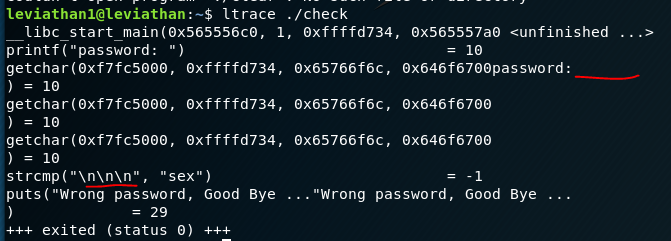
We can see that whatever we enter (in this case I just pressed Spacebar) is checked against the string “sex” using a C function called strcmp (string compare). So, this should be obvious that the password is “sex”. We can try this and we will have leviathan 2 privileges. We can then check the password file in /etc/leviathan_pass/leviathan2.

Leviathan 2 pass: ougahZi8Ta
Leviathan 2
We find a file called printfile. It is a setuid binary meaning it is owned by leviathan 3. We can therefore, like in the bandit challenges, use the binary file privileges to get the password. The printfile binary does what it says - prints a file.
First thing to check would be trying to print the leviathan3 password:

But it does not let us for some reason. Next thing is to go to ltrace:

We can see it runs the access function that will check the permissions on the file and as above we have a return code of -1 which means it fails. Let’s run printfile on something we can print and see what happens:

We can see it checks the permissions and then takes the file path and throws it on the end of the /bin/cat command to cat the file out. This is tricky, but there is a command execution bug with this that we can exploit. We need to make a file in our tmp directory first.
Useful note: we can use the mktemp command to make a temporary file or in this case a temporary directory.

Let’s make a file called fake;bash. The semi colon indicates a new command on the same line (&& does the same). If we run this:

We can see it created the bash file and put us in a new shell, hence why exit does not remove us from the server. We need to use ‘’ or“” to tell Linux to interpret the file name literally:
Note: when away from the home directory using ~ will reference the current home directory.

And you can see if we run it with the quotes, we get a permission denied as it was trying to find a file called fake which does not exist. The file was called fake;bash but the bash part got executed. Therefore, we find ourselves in a new shell as leviathan3 and we can get the password.
Solution 2:
We can use symbolic links to also get the password here using a syntax hack on the binary. If we create the temp file with spaces in it and run it against printfile we get this:
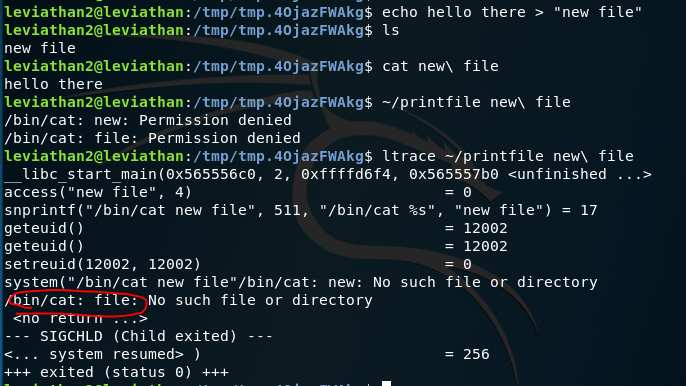
As we can see there is a syntax security hole here where the binary is looking to cat only the second half of the file name if it has a space. This means that it is treating the new and file as two separate files. We can exploit this by creating a symbolic link to the first or second file:

ln creates a link, and -s means symbolic. We don’t have the permissions to create a hard link. Now as we can see the file called new has a symbolic link to the password file. Let’s run printfile again:

Notice we can replace the quotations for the escape character for the space.
Note: For this solution we must create our own tmp directory by hand like in the above picture else we do will not have permissions to read the files. Very important.
Leviathan 3 pass: Ahdiemoo1j
Leviathan 3
We have a file called level3. Once again it is a setuid file with the owner being leviathan4. It wants a password. Let’s ltrace:
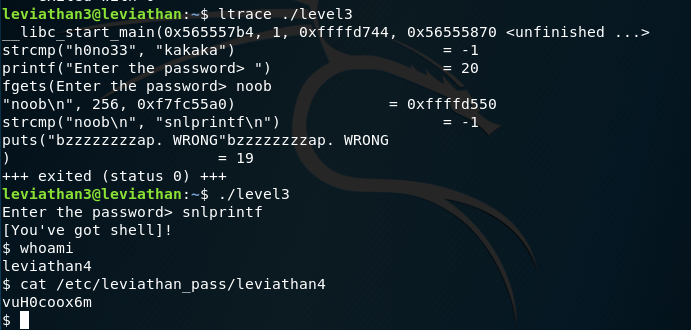
We can see it is trying to obfuscate the password by calling strcmp twice, the first redundantly. If we look at the one that compares the input it compares it to snlprintf. If we try that, boom, we have permissions for leviathan4. Easy as that.
Leviathan 4 pass: vuH0coox6m
Leviathan 4
When we check the home directory, we see nothing. We’ll try list all. What we get is a trash directory. If we navigate to it, we find a binary called bin with setuid privileges for leviathan5. Running the file, we get a binary stream. If we ltrace it we can see it using fopen, which is file open, to open the leviathan file in r mode (read mode).
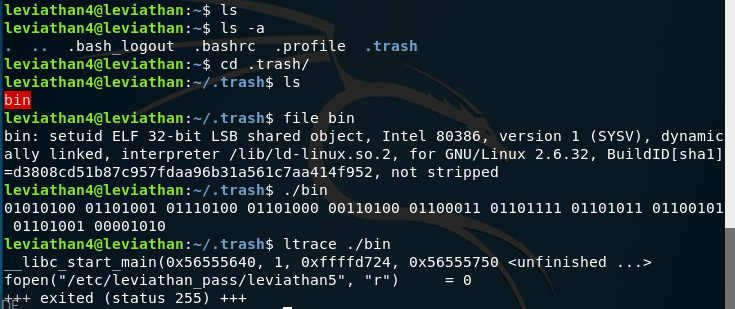
The binary is obviously the password, and we can use a web converter to convert this easily. As part of the learning experience, we will to try convert this in the command line.
We will need to use bc called binary converter / base converter to get hex then xxd to get our ASCII readable text. We can use a few tools here, Python or Perl or just Bash stuff, whatever works. I’ll show the Bash way.
We can write a Bash line with a lot of pipes to get the hex output then convert it to ASCII. If we translate the white space and replace it with new lines, we get each character on a new line. Then we can convert the binary strings to hexadecimal using the bc tool. Then we can delete the new lines (with the -d flag) and pipe it to xxd and convert it to ASCII using the -r and -p flags (reverse the operation, turn hex to binary and print postscript / without the columns or line numberings).
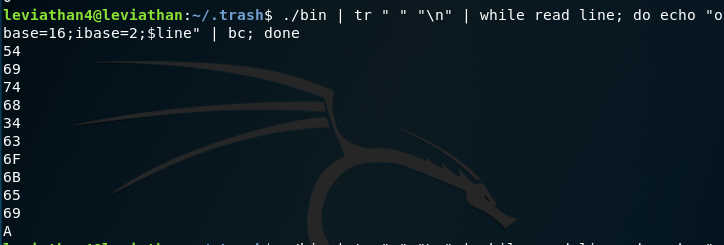
Basically, the xxd -r -p command takes our hex and reverts it to text and prints it out the plain dump.
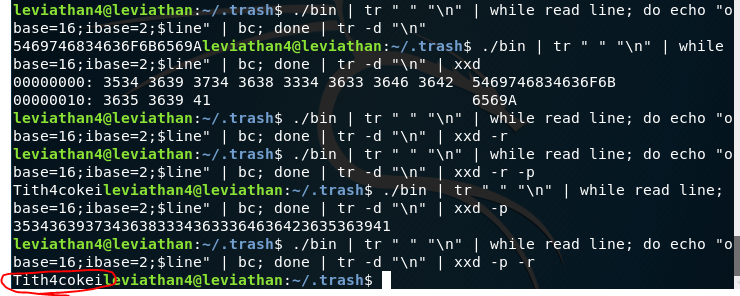
Leviathan 5 pass: Tith4cokei
Leviathan 5
Using some of the tools from previous challenges we can get the password quite easily. We have a binary which looks for a file in tmp called file.log. If we create this file, we can see how the binary interacts:
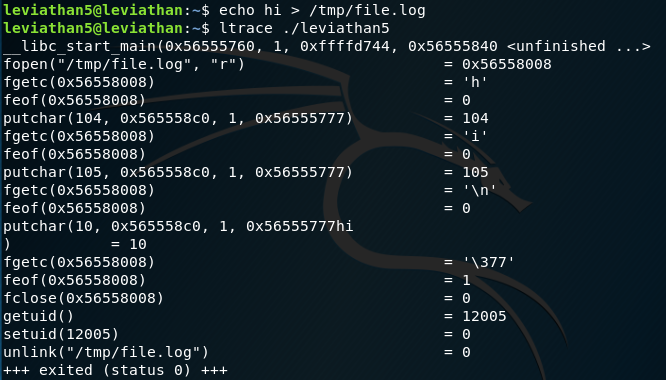
It gets the characters from the file and basically prints them out then deletes the file. So, is there a way where we can read a file from another file, given that we have leviathan6 permissions when we run this? Yes, using symbolic links. If we create the file.log it will not work, we have to create the file during the link operation. And then run the binary and the password is ours.

Leviathan 6 pass: UgaoFee4li
Leviathan 6
The home directory contains a binary called leviathan6.bin. Running it tells us we need a 4-digit pin, and the correct one will give us the correct password. The obvious solution is to brute force all 10000 combinations.

One way is to write a small script like so in our tmp folder:
Note: this can also just be done in one line in our shell like so:

As a script:
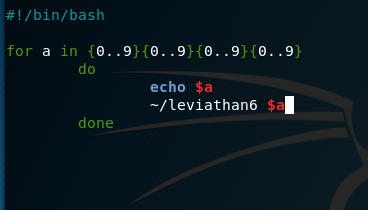
This will try all the combinations and run them against the binary:
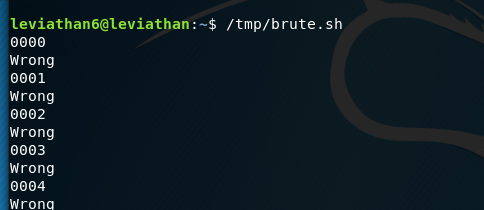
Until it stops. We now know that 7123 is the pin as we have a shell for leviathan7.

If we enter this against the binary (or just keep typing in the above step) we get our shell for leviathan7 privileges.
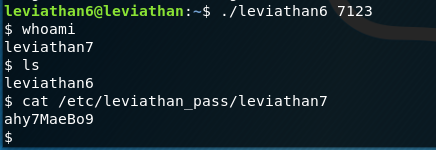
Leviathan 7 pass: ahy7MaeBo9
Leviathan 7
This is just a congratulatory level with a nice message and a request that I have so brazenly ignored by publishing this:

And that’s all the Leviathan challenges! If you have any questions, ask away.

Leave a comment